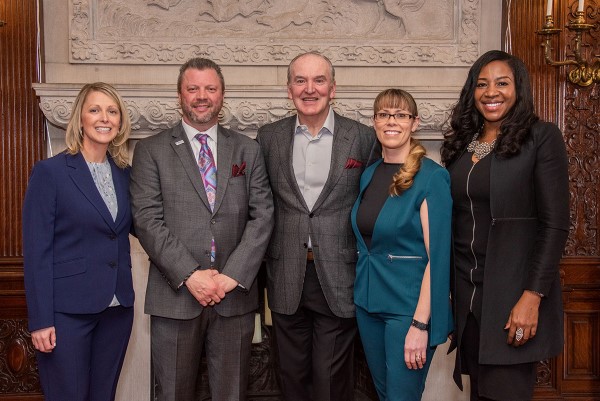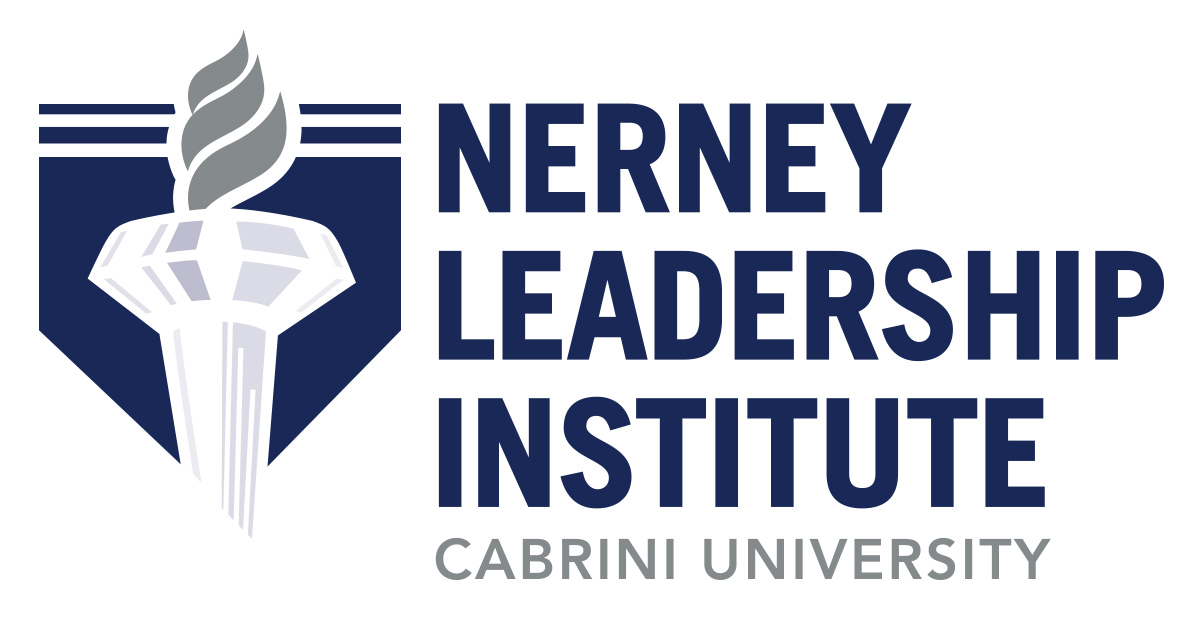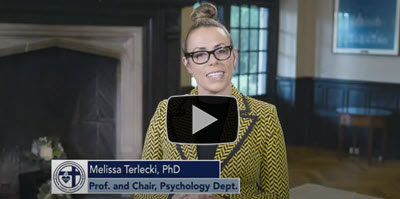When Cabrini’s Nerney Leadership Institute (NLI) had its relaunch event on Feb. 19, 2020, no one could have expected the stark differences the nation—even the world—would see in less than a month.
But when the COVID-19 pandemic and mitigation measures forced closures and lockdowns across the nation, the reinvention at NLI continued. NLI Co-Directors Anne Filippone, Executive Director of Student Engagement and Leadership, and Melissa “Missy” Terlecki, PhD, Psychology Professor and Department Chair, have reinvigorated the mission of the Institute to bring to life the values of founder and supporter Thomas P. Nerney (’77, HON’15), for which the NLI is named.
 |
| (From left) Filippone; Cabrini President Donald B. Taylor, PhD; Nerney; Terlecki; and Cabrini Provost and Vice President of Academic Affairs Chioma Ugochukwu, PhD |
Bringing Leadership to Life
“My vision for the Nerney Leadership Institute has always been, and continues to be, for students at Cabrini to leave after four years with something that could impact them and separate them from other students graduating,” said Nerney, a former Cabrini Trustee and Board Chair, at the relaunch. “Developing leadership skills brings out the best in you, unleashes your full potential—and I do think it makes life more fun.”
Filippone and Terlecki have identified the Social Change Model of Leadership Development as one that closely aligns with Cabrini’s social justice focus and connects the dots between leadership and life.
According to the Social Change Model:
- Leadership is socially responsible; it impacts change on the behalf of others.
- Leadership is collaborative.
- Leadership is a process, not a position.
- Leadership is inclusive and accessible to all people.
- Leadership is values-based.
- Community involvement/service is core.
Terlecki describes leadership as working for the greater good. “It means maximizing your and others’ potentials to be the best they can be,” she said. “It means being a voice for those who do not have one; being an agent for positive change in this world.”
But how are those ideals applied in real life? The NLI is making those connections—first, by helping define leadership and on-campus instances and opportunities, and then working to expand that skillset and help people apply those skills to their communities.
“Leadership isn’t a position, it’s the whole experience, the process of working collaboratively with other people, really working toward a common goal or purpose,” said Filippone.
“In the Social Change Model, there are three critical components in addressing leadership: Self, group, and community,” she said. “In order to be a strong leader, you have to understand yourself. What are your values, beliefs, strengths, and areas for improvement? What do you bring to the leadership experience?”
With a solid understanding of self, said Filippone, “You can determine how you take that self-awareness and those components and identify how it all works together in the group setting. Recognize the different strengths people bring to the experience and the value in that diversity, and how to maximize all those different components to be as effective as possible.”
Facilitating group dynamics helps bring leadership into the broader community, according to the Filippone and Terlecki, who have both been involved in different leadership initiatives since coming to Cabrini 15 years ago.
“We’re all a part of different communities,” said Filippone, “but understanding that we have a responsibility, we need to be active, we need to be involved members of our communities—how do we get all of those pieces to work together to create positive change?”
“Leadership development allows individuals to work on self-awareness, or maximizing their potential; to work collaboratively and respectfully with others, or gain a better understanding of group dynamics; and to work toward community change through agency and advocacy,” said Terlecki, connecting sense of self with community leadership. “All of these skills benefit one’s professional relationships and management aptitude. Outside of one’s career, being self- and other-aware correlates with greater happiness, life, and relationship satisfaction.”
In addition to effecting positive change and greater satisfaction, leadership skills increase employability.
“Employers say they can train someone in specific content areas, but that it’s harder to train someone to write and communicate effectively, to be professional in different settings and to understand differences across settings, to be emotionally aware of what you’re bringing to a leadership process,” said Filippone. “Those broad-based, foundational components are critical because they’re applicable no matter what industry you’re working in. A lot of college students today are going to be working in careers that don’t even exist right now. These competencies are effective and transferrable across fields and careers.”
The Nerney Leadership Promise
With the relaunch of the NLI came the Nerney Leadership Promise.
“The Nerney Leadership Promise states that all students, no matter what their background or experience, will gain leadership development—curricular and co-curricular—across their four years at Cabrini University,” said Terlecki. “For undergraduate students, this means leadership content will be embedded in both general education and major coursework. Co-curricular opportunities will also be offered by the NLI. We are also working to incorporate leadership development into graduate, faculty, and staff training.”
See the Nerney Leadership Promise presented at Cabrini's 6th Annual Visionaries Gala, a virtual event.
In other words, the NLI is starting with an internal focus.
“Leadership is happening all over campus—but people don’t always realize it,” said Filippone. “We need to more intentionally make those connections for people. Part of the NLI’s role is reaching out to build partnerships with departments, to help them understand the key elements of leadership, how leadership relates to Cabrini and our mission, and how we can help identify and really maximize where it is already happening.”
The co-directors point to College Success, Engagements with the Common Good (ECG), and the high-impact practices of senior capstones and internships as existing exercises in leadership development. College Success in the first year focuses on the development of the self, while ECGs in the second and third years focus on group and community building. Senior, fourth year capstones and internships within major departments offer professional development in relation to future careers. All four places highlight developmentally appropriate leadership training as it relates to the Social Change Model.
“The revitalized NLI aims to collaborate with other departments and centers around campus to maximize resources, talents, and visions to fulfill our mission at the institution,” added Terlecki. “We will not be siloed in one discipline, but bridge curricular and co-curricular opportunities to serve all constituencies, on and off-campus, in the areas of leadership development.
“Most notable is our online microcredentials, which will be offered to students, faculty, staff, and external constituencies.” These microcredentials, which will be free to the campus community and are currently being developed and are expected to launch prior to the Winter 2020 Break, “will focus on earning competence in specific areas of leadership development, relevant to professional areas of interest. These microcredentials can be easily added to a resumé or curriculum vitae and uploaded to social media platforms instantaneously. It is an easy and recognizable way for someone to advertise their skills and proficiencies.”
Ultimately, Cabrini’s NLI is making a leadership skillset tangible on campus and applicable everywhere.
“Often when people think about leadership, they think about a global movement, or that they have to do something on a major scale to be seen as a leader,” said Filippone. “Leadership can really be about small changes. Recognizing that the act of making a positive contribution, of bringing yourself fully to that experience—that’s leadership.”

